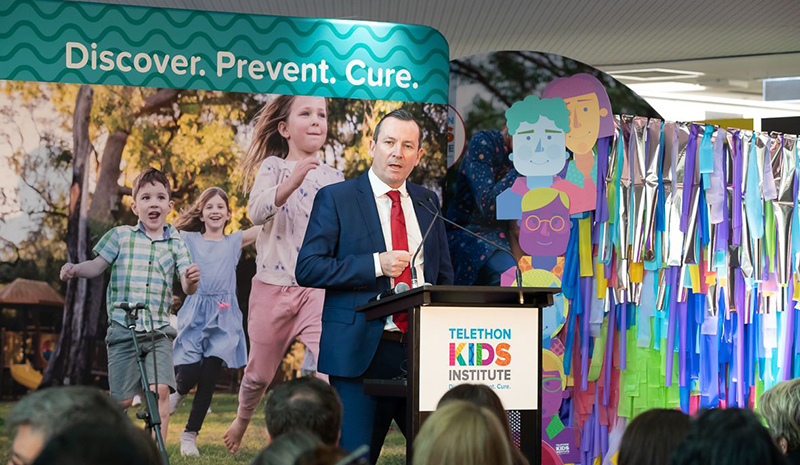Search

News & Events
Endgame for deadly heart disease will save hundreds of livesRheumatic heart disease, a deadly yet entirely preventable heart disease taking the lives of Aboriginal and Torres Strait Islander people, is finally on the verge of elimination thanks to new research

News & Events
For kids, by kids: New “Boom Boom” song teaches children how to prevent deadly heart diseaseOnce you hear it, you won’t be able to get it out of your head – and that’s exactly the point of the new song ‘Boom Boom’.


News & Events
Discovery Centre makes science funBudding young scientists can now gain an insight into the world of research thanks to The Kids Research Institute Australia’s newly opened Discovery Centre.
Research
Complete genome sequence of Burkholderia cenocepacia bacteriophage Karil-mokiny-1Burkholderia cepacia complex causes life-threatening respiratory infections. Here, a bacteriophage with activity against B. cenocepacia was isolated from wastewater. It has a genome size of 70,144 bp and has the taxonomic classification Irusalimvirus. It has no genes associated with lysogeny, bacterial resistance, or virulence.
Research
Streptococcus pyogenes Surveillance Through Surface Swab Samples to Track the Emergence of Streptococcal Toxic Shock Syndrome in Rural JapanJapan recently experienced a record surge in streptococcal toxic shock syndrome. Our environmental surveillance study reveals that Streptococcus pyogenes persists seasonally, peaking in autumn and winter in rural Japan. The dominant emm1 M1UK sublineage and csrS mutations heighten virulence, highlighting the urgent need for targeted surveillance and interventions.
Research
A modular approach to forecasting COVID-19 hospital bed occupancyMonitoring the number of COVID-19 patients in hospital beds was a critical component of Australia's real-time surveillance strategy for the disease. From 2021 to 2023, we produced short-term forecasts of bed occupancy to support public health decision-making.
Research
The mitophagy receptors BNIP3 and NIX mediate tight attachment and expansion of the isolation membrane to mitochondriaBNIP3 and NIX are the main receptors for mitophagy, but their mechanisms of action remain elusive. Here, we used correlative light EM (CLEM) and electron tomography to reveal the tight attachment of isolation membranes (IMs) to mitochondrial protrusions, often connected with ER via thin tubular and/or linear structures.
Research
Rewiring endogenous genes in CAR T cells for tumour-restricted payload deliveryThe efficacy of chimeric antigen receptor (CAR) T cell therapy in solid tumours is limited by immunosuppression and antigen heterogeneity. To overcome these barriers, 'armoured' CAR T cells, which secrete proinflammatory cytokines, have been developed. However, their clinical application has been limited because of toxicity related to peripheral expression of the armouring transgene.
Research
Benchmarking Imputed Low Coverage Genomes in a Human Population Genetics ContextOngoing advances in population genomic methodologies have recently enabled the study of millions of loci across hundreds of genomes at a relatively low cost, by leveraging a combination of low-coverage shotgun sequencing and innovative genotype imputation methods. This approach has the potential to provide abundant genotype information at low costs comparable to another widely used cost-effective genotyping approach-that is, SNP panels-while avoiding potential issues related to loci being ascertained in distantly related populations.
